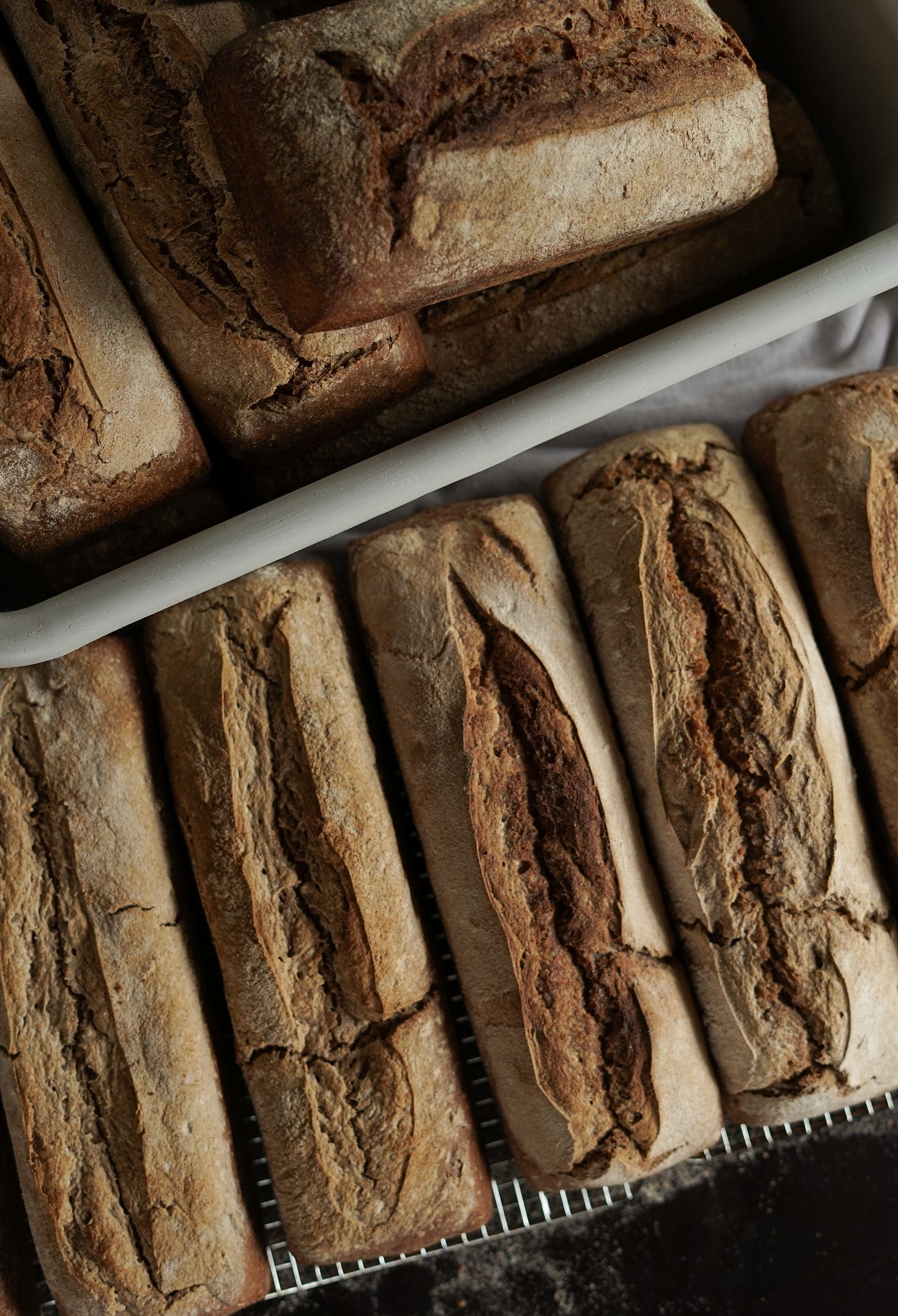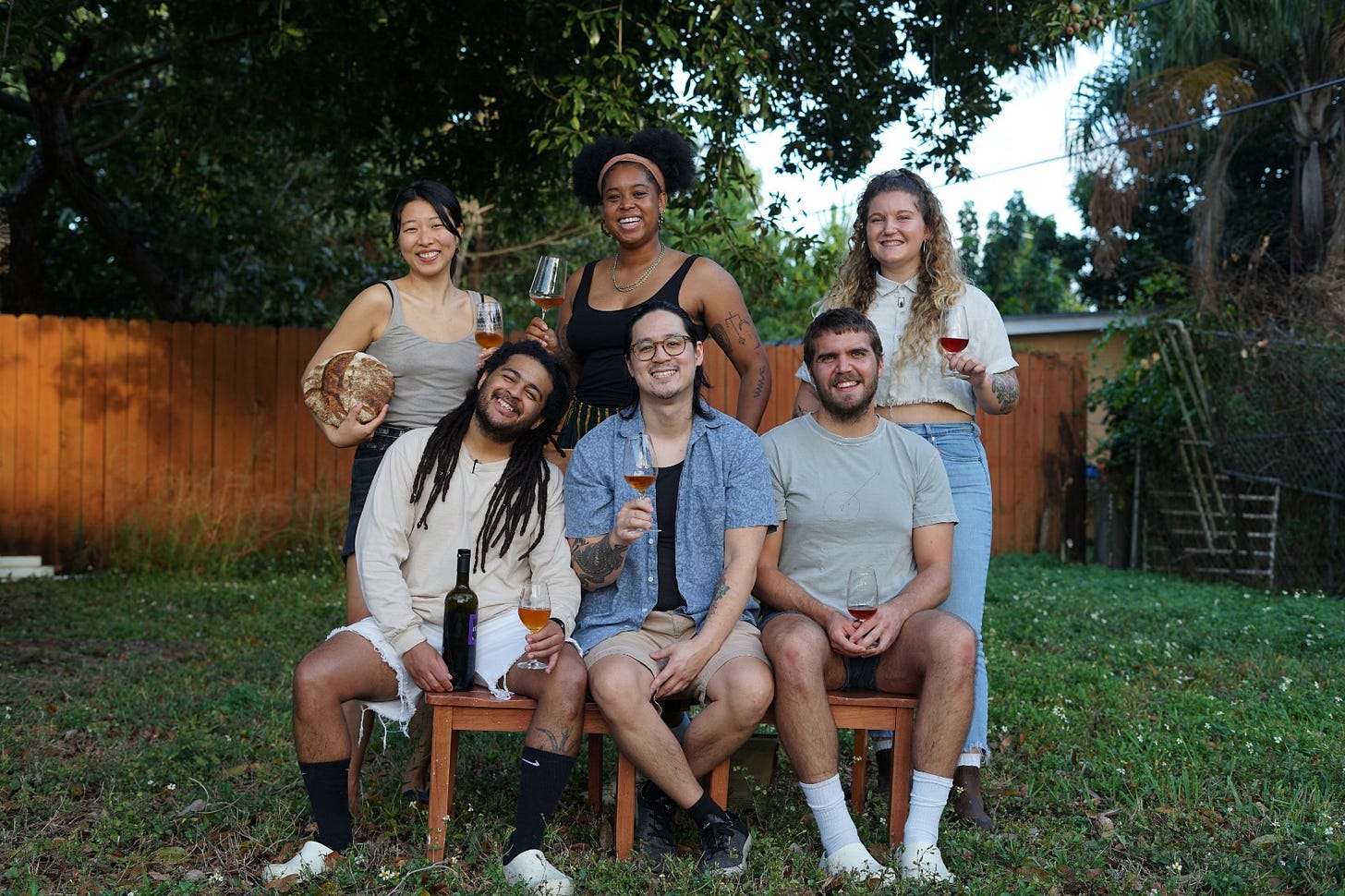Lunch Q+A: Meet Bianca, a food producer with a bold vision in Miami
Lunchtime Q+A #1: Bianca Sanon
We interrupt our regularly scheduled programming to bring you this lunchtime Q + A with Bianca Sanon, co-founder of paradis books + bread in Miami. Also, make sea salt tonight with Jackie! New to Sunshine + Microbes, sign up here (and follow us on Instagram!):
There are only a handful of bakers in Florida working with the incredible stone-ground flours from Carolina Ground. When I heard a new Miami bakery was joining the Carolina Ground club, I was intrigued. When I heard the bakery would also be a natural wine bar 🍷, cafe ☕, and bookshop📚 run by a group of friends, I was over the moon (and a bit jealous!).
I reached out to Bianca Sanon, a sommelier who spent time in the New York City restaurant scene before bringing her talents back home to South Florida. She is now one of the co-founders of the forthcoming paradis books + bread. We discussed why the group picked Miami, the disconnect between Floridians and who grows their food, and how returning to South Florida means devouring home-cooked Haitian food with her parents and discovering restaurants shaped by the Caribbean diaspora.
The following has been edited for length and clarity
Describe your vision for paradis books + bread. Why do you want to open your own space?
paradis books & bread is a project between six friends, a culmination of all of our experiences and passions in one place. The idea was born almost 10 years ago; we were all in one way or another immersed in the New York restaurant world, and at the time we were most inspired by the idea of opening a casual yet refined restaurant, in the traditional sense. But as our experiences and interests expanded over the years, we came to realize that a restaurant was just not enough to support what we ultimately wanted to share with others.
From there, we became more and more interested in the question of what a physical space can offer, obsessing with the idea that there’s something special about coming together, as well as the possibilities for learning with, caring for, and enjoying one another. We wanted to have a space of our own, where we could create, experiment, and explore with others. There needs to be affordable food to eat, coffee for our morning folks, delicious wine for our evening crowd, and books that you could certainly buy but also sit-in and read for free. We’ve found it incredibly special to try to do this here in Miami because it is a city where there is room to experiment and where people are open to new projects that don’t fit certain molds.
What do you love about Florida food culture? What needs fixing?
I love how deeply connected South Florida food culture is with the Caribbean diaspora. Honestly some of my favorite places to eat in Florida are small mom & pop immigrant-owned establishments, run by people who want to share a piece of their story and what brings them comfort with others. I think there needs to be a way to show how much we as South Floridians care about and support these establishments beyond the bare minimum. LA had Jonathan Gold, NYC has their reviews, and I wish Miami had a prolific food writer that specifically found and shared the stories of these special gems so the people know about them and can support them.
Favorite thing to eat in South Florida?
I lived away from home for a while so being able to go to my parents’ house and have home cooked Haitian food is always a personal favorite. My aunt is an incredible cook and I truly believe she makes the best griot I’ve had anywhere.
What has been your strategy for cooking and staying fed during the pandemic? Has the pandemic taught you anything about how you eat or the restaurant industry that you didn't realize before?
All of us working at paradis live together, so we’ve been able to experiment on different recipes at home both for the space and for ourselves. This past year, we’ve made everything from Mapo Tofu to Butter Chicken to Filipino Sour Soup to Pupusas together. Personally, I haven’t eaten out too much during the pandemic, and that’s been extremely hard for me because I love going out to restaurants and the entire ritual of it all. Sure, I love the food and the wine, but what I really miss is the entire restaurant experience, the excitement you get when you order food, the hospitality from the staff, the ambiance of the dining room and the energy you get from the entire place when everyone is feeding off the good energy in the place. I know how much I’ll appreciate those things again post-Covid.
How has working as a Haitian-American sommelier in the notoriously white wine industry shaped your experiences in the restaurant world and plans for your own food business?
I feel very connected to my heritage because I grew up with a strong Haitian culture in my house, though my parents never fully taught me how to speak Kreyol. If there’s anything people should know about Haitian people, it’s that we are a resilient group of people and very proud of the work that we put in. As a Black female sommelier, I’ve had experiences with microaggressions in the past, and I do carry those with me as I move in a different, more authoritative position in this industry where I will be able to speak up more clearly when those instances occur again (because they will). But I’m mostly looking forward to connecting with the North Miami community which has a strong Haitian population and sharing what I know about wine, food, and bread, and have the community shape our space so that it can fit their needs as well.
You spent time in North Carolina, which has a well-developed local bread culture. What aspects of that are you hoping to bring back to Florida?
Respect for the base product is big in North Carolina — where something is grown, who grew it, what their connection is to the land it was grown on, and how that all gets communicated to the customer who buys the final product. After speaking with some Florida-based friends in the industry, we came to realize how deeply disconnected people here are with who is growing their food. I would love to bring that kind of appreciation and respect for the grains and the products and the labor that goes into bread baking back to Florida’s blossoming local bread community. There are so many outstanding sources of high quality grains and flours in SC and NC, which is not a far drive away, and the more consumers realize that and understand that, the more I think there can be room for an even stronger local bread culture.






Her intolerance disgusts America. We are tired of divisive people like her who claim to be tolerant, but can’t even have someone in a restaurant that doesn’t fit her vision. She is disgusting.